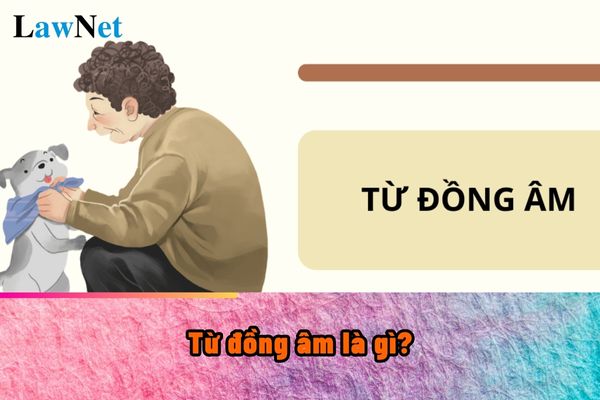What is a homonym? When do students in Vietnam learn about homonym according to the Literature curriculum?
What is a homonym?
Students can refer to the content below to understand about homonyms in Vietnamese:
|
What are homonyms? Homonyms are words that are pronounced the same and spelled the same but have completely different meanings. This means that although we hear and write them the same, when used in a sentence, they have distinct meanings. |
*Note: Information is for reference only./.

What is a homonym? When do students in Vietnam learn about homonym according to the Literature curriculum? (Image from Internet)
When do students in Vietnam learn about homonym according to the Literature curriculum?
Based on Section 5 of the Literature Education Program issued with Circular 32/2018/TT-BGDDT, the Vietnamese Language section for grade 6 students includes:
VIETNAMESE LANGUAGE KNOWLEDGE
- Simple words and compound words, compound phrases
- Polysemous words and homonyms
- Meaning of some common idioms
- Meaning of some common Sino-Vietnamese elements (e.g., bất, phi) and the meaning of words with those elements (e.g., bất công, bất đồng, phi nghĩa, phi lí)
- Main components of sentences: expanding the main components of sentences with phrases
- Adverbial modifiers: characteristics, function linking sentences
- Use of semicolons (to mark boundaries between complex enumeration parts); quotation marks (to indicate understanding of a word not in its usual sense)
- Rhetorical devices of metaphor and metonymy: characteristics and effects
- Paragraphs and texts: characteristics and functions
- Selection of words and some sentence structures suitable for expressing the meaning of texts
- Text type and genre
+ Narrative text: an essay recounting a personal experience, an essay retelling a folk tale
+ Descriptive text: an essay describing a life scene
+ Expressive text: six-eight syllable poem; paragraph recording emotions when reading a six-eight syllable poem
+ Argumentative text: opinion, reasons, evidence; an essay expressing opinions on a phenomenon in study or life
+ Informative text: title, subheading, heading, bold, numerical order, and bullet points; explanatory text recounting an event; memorandum recording an issue or a meeting, discussion
- Language development: phenomena of borrowing words, loanwords, using borrowed words
- Non-linguistic communication means: images, data.
Thus, homonyms are taught in the Grade 6 Literature program.
What materials are used in grade 6 Literature in Vietnam?
Based on Section 5, Item 2 of the Literature Education Program issued with Circular 32/2018/TT-BGDDT, the materials used in Grade 6 Literature include:
(1) Literary texts
- Legends, fairy tales, fables, short stories
- Poetry, six-eight syllable poems
- Memoirs or travelogues
(2) Argumentative texts
- Social commentary
- Literary commentary
(3) Informative texts
- Texts recounting an event
- Record memos
- Summary diagrams
There will be some texts as follows available for selection:
GRADE 6 AND GRADE 7
Stories, novels
- The Last Lesson (A. Daudet)
- Búp sen xanh (Sơn Tùng)
- Bức tranh của em gái tôi (Tạ Duy Anh)
- The Little Match Girl (H. Andersen)
- Đất rừng phương Nam (Đoàn Giỏi)
- Dế Mèn phiêu lưu kí (Tô Hoài)
- Điều không tính trước (Nguyễn Nhật Ánh)
- Ếch ngồi đáy giếng (Vietnamese Fable)
- Lá cờ thêu sáu chữ vàng (Nguyễn Huy Tưởng)
- Treo biển (Vietnamese Folk Comedy)
- The Old Man and the Sea with the Golden Fish (A. Puskin)
- Thánh Gióng (Vietnamese Legend)
- Thạch Sanh (Vietnamese Fairy Tale)
- ...
Poetry, folk songs, proverbs
- Folk songs about love, family emotions
- Cảnh khuya (Hồ Chí Minh)
- Bài thơ về tiểu đội xe không kính (Phạm Tiến Duật)
- Dặn con (Trần Nhuận Minh)
- Hành trình của bầy ong (Nguyễn Đức Mậu)
- Khi con tu hú (Tố Hữu)
- The Cloud and the Waves (R. Tagore)
- Mẹ (Đỗ Trung Lai)
- Những cánh buồm (Hoàng Trung Thông)
- Quê hương (Tế Hanh)
- Sơn Tinh, Thuỷ Tinh (Nguyễn Nhược Pháp)
- Tiếng vọng (Nguyễn Quang Thiều)
- Tục ngữ Việt Nam
- Viếng lăng Bác (Viễn Phương)
- ...
Essays, prose
- Cây tre Việt Nam (Thép Mới)
- Cõi lá (Đỗ Phấn)
- Cô Tô (Nguyễn Tuân)
- The Love of Our Country (I. Ehrenburg)
- One Liter of Tears (Kito Aya)
- Người ngồi đợi trước hiên nhà (Huỳnh Như Phương)
- Những năm ở tiểu học (excerpted from Memoirs of Nguyen Hien Le)
- Thẳm sâu Hồng Ngài (Tống Lam Linh)
- Thương nhớ mười hai (Vũ Bằng)
- Tôi ăn Tết ở Côn Lôn (Khuông Việt)
- Trưa tha hương (Trần Cư)
- ...
Argumentative texts
- Social argumentative essay: about a phenomenon of interest.
- Literary argumentative essay: character analysis and analysis of a literary work.
- Letter from a Native American Chief (Seattle)
- Đức tính giản dị của Bác Hồ (Phạm Văn Đồng)
- Sự giàu đẹp của tiếng Việt (Đặng Thai Mai)
- Tinh thần yêu nước của nhân dân ta (Hồ Chí Minh)
- ...
Informative texts
- Text recounting a historical event (explanatory).
- Text introducing a rule or law in a game or activity (explanatory).
- Petition letter; memorandum, message, email.
- ...

